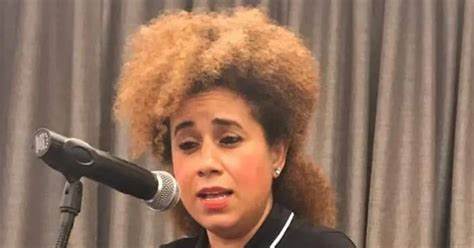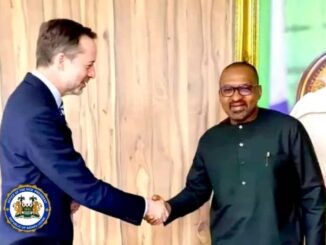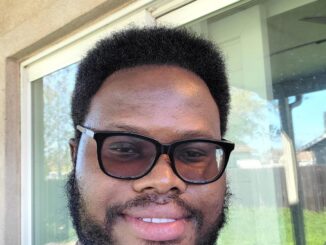
A shadow descended over Sierra Leone’s justice system on December 7th, 2023, with the revelation that Chief Justice Desmond Babatunde Edwards (Photo above) had “taken leave.” This announcement, delivered through a letter disseminated on social media from the Secretary to the President, introduced Hon. Nicholas Colin Browne-Marke as Acting Chief Justice, presumably in line with Section 136(1) of the Constitution.
Disturbing Historical Pattern
While silent on the specifics of Chief Justice Edwards’ leave, the letter aligns with a disquieting historical pattern. Instances of Chief Justices proceeding on ‘forced’ leave, never to return. This recurrent pattern, whether motivated by a desire to shield incumbents or reward past allegiances, poses a severe threat to judicial autonomy.
It raises questions about the reluctance to adhere to due process and the rule of law particularly the provisions of Section 137(8), (9) and (10) of the Constitution, which provides for the setting up of a tribunal to investigate the Chief Justice if there is a question about his removal.
The President can remove the Chief Justice from office if the question of removal is referred to a tribunal appointed under subsection (8), and the tribunal recommends to the President that the Chief Justice should be removed from office and a two-thirds majority in Parliament approves the removal.
Judicial and Legal Sentiments
In the absence of an investigation, the precise nature of Chief Justice Edwards’ departure remains shrouded in mystery. However, whispers of relief reverberate through the majority of the judiciary and the legal community. To quote some of his critics, his tenure has been marred by allegations of judicial tyranny, abuse of power, corruption, and victimisation, fuelling anxieties about the erosion of the rule of law.
Some members of the Bar have acknowledged the Chief Justice’s alleged transgressions but have expressed concerns about the impact on the security of tenure of judges of the superior court of judicature. Questions regarding the constitutionality of Justice Browne-Marke, being a retired judge appointed under section 136(4) of the Constitution, serving as Chief Justice also emerge.
Legal and Judicial Hypocrisy
The full extent of the damage caused to the judiciary by the Chief Justice remains unknown. However, what is certain is the unprecedented and overwhelmingly strong sense of relief many feel.
Conversely, it is evident that certain members of the Sierra Leone Bar Association (SLBA) and the judiciary are seizing this situation to deflect criticism away from their lapses in safeguarding justice, public interest, and the rule of law.
During my tenure as President of the SLBA, I wrote to His Excellency the President, advising against the illegality of Desmond Edwards’ appointment as Chief Justice without the recommendation of the Judicial and Legal Service Commission (JLSC). Unfortunately, this plea fell on deaf ears.
In my capacity as a member of the JLSC, I submitted to the SLBA a damning report in 2020 on how the Chief Justice managed the proceedings of the JLSC, expressing grave concerns about the appointment of judges and magistrates, among other issues.
Regrettably, the SLBA, instead of acting on the report, chose not to disclose it to the general members. Despite knowledge of the report, some general members did not demand its disclosure. To date, that particular report, along with others, remain neglected.
The judiciary’s dignity and integrity were steadily eroded, with the SLBA seemingly indifferent to the proceedings.
As historians recount the tumultuous events of this period, the SLBA will likely be deemed to have failed the country, bearing significant responsibility for our descent into the tyranny reported by members of the judiciary. History will reflect on how the Bar Association, entrusted with safeguarding the rule of law, became an unwitting accomplice to its subversion.
The last Truth and Reconciliation Commission Report criticised the Bar heavily, and a future one may cast an even harsher judgment.
The Way Forward
Rather than fixating on the legality of a retired judge serving as Chief Justice, a crucial shift in focus is needed. Collective efforts should aim to prevent history from repeating itself. Judges and lawyers, as custodians of the law, must demand accountability, utilising their knowledge to uphold the integrity of the legal system. A comprehensive investigation into recent events is essential to prevent another Chief Justice from departing without accountability and enjoying substantial benefits.
Concluding Thoughts
The legal and judicial communities, notably the Sierra Leone Bar Association (SLBA), have demonstrably failed to hold Chief Justice Edwards accountable. This dereliction of duty has severely undermined the rule of law, jeopardising Sierra Leone’s democratic fabric. Immediate and comprehensive legal and political actions are required to safeguard the nation’s future and uphold justice.
The SLBA, the judiciary, and the Executive must unite to demand a complete overhaul of the justice system. This begins with setting up a tribunal to thoroughly investigate Chief Justice Edwards’ tenure, followed by an unwavering pursuit of accountability. This is the only path toward a future where justice prevails and the rule of law reigns supreme.



